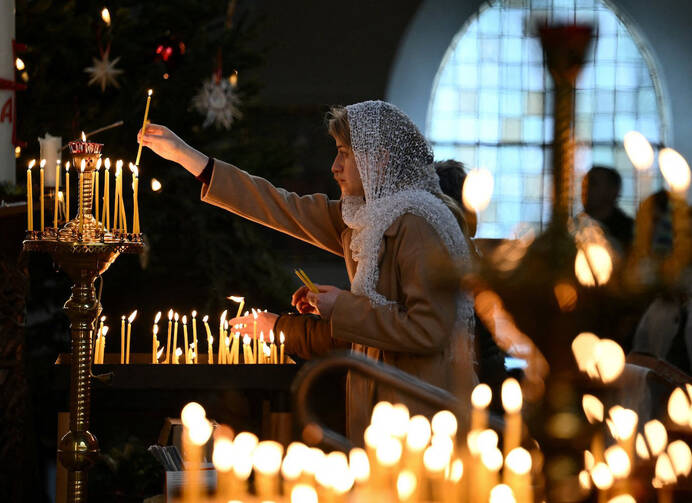(OSV News) — Ukraine President Volodymyr Zelenskyy has signed into law a bill moving the official observance of Christmas Day to Dec. 25 from Jan. 7, when Moscow and the Russian Orthodox Church mark the holiday.
Ukraine’s parliament, the Verkhovna Rada, approved the measure — which also adjusts the dates of the Day of Ukrainian Statehood and the Day of Defenders of Ukraine — on July 14, with Zelenskyy formalizing it on July 28.
Zelenskyy had introduced the legislation June 28, with an explanatory note that the change would “discard the Russian legacy of celebrating Christmas on Jan. 7,” the date for the holiday according to the Julian calendar, which is used by the Russian Orthodox and other Eastern Orthodox churches. The Julian calendar and the Gregorian calendar — implemented in 1582 by Pope Gregory XIII and used by Western churches — differ by 13 days.
The change signals “a huge cultural shift,” while “recognizing what’s been in practice anyway for quite some time,” said Nicholas Rudnytzky, professor of history and dean of academic services at Manor College in Jenkintown, Pennsylvania, a school with deep roots in the Ukrainian-American community.
The change signals “a huge cultural shift,” while “recognizing what’s been in practice anyway for quite some time.”
Last year, the Orthodox Church of Ukraine — which is wholly independent of the Russian Orthodox Church — allowed faithful to celebrate Christmas Dec. 25, and later announced it would switch to the Revised Julian calendar which observes the feast that day.
In February, the Synod of Bishops of the Ukrainian Greek Catholic Church voted to celebrate Christmas on Dec. 25, as well, while permitting parishes to gradually roll out the change with their bishops’ permission.
Breaking ties
Days before the official change in date by Ukraine’s government, close to 300 priests of the Ukrainian Orthodox Church issued a July 23 letter calling to definitively break ties with the Russian Orthodox Church, following a Russian attack on Odesa that destroyed a historic cathedral while killing two and injuring at least 22, including four children.
Close to 80% of Ukraine’s population identifies as Orthodox, but that affiliation has become increasingly complex in light of Russia’s decade of aggression against Ukraine, which began in 2014 with attacks on the Donbas region and the attempted annexation of Crimea.
Professor Nicholas Rudnytzky said the date change “will serve towards the paradigm shift – not by itself, but as part of the whole package.”
In January 2019, Ecumenical Patriarch Bartholomew I of the Constantinople Patriarchate — the “first among equals” of the Orthodox churches — formally recognized the independence of the Orthodox Church of Ukraine.
A few months prior, he had restored Metropolitan Filaret, head of the UOC-Kyiv Patriarchate — an independent Orthodox church in Ukraine — to full communion. In response, the Russian Orthodox Church, led by Patriarch Kirill, a close ally of Russian President Vladimir Putin, severed communion with Constantinople.
The UOC, which had historically remained loyal to Russia, broke with the Moscow Patriarchate in May 2022 over Kirill’s vigorous endorsement of Russia’s war on Ukraine. The patriarch has blessed Russian troops and claimed their death in battle “washes away all sins.”
Loyalty investigated
Despite the May 2022 break with Moscow, Ukrainian officials remain wary of the UOC and lingering loyalty to Russia, and have continued investigations into ties between the church and Moscow.
On July 28, the Verkhovna Rada considered draft legislation that would move to ban the UOC-Moscow Patriarchate, reviewing a bill outlawing religious organizations operating in Ukraine but headquartered outside the country “in a state that carries out armed aggression against Ukraine.”
Rudnytzky said the date change “will serve towards the paradigm shift – not by itself, but as part of the whole package.”








